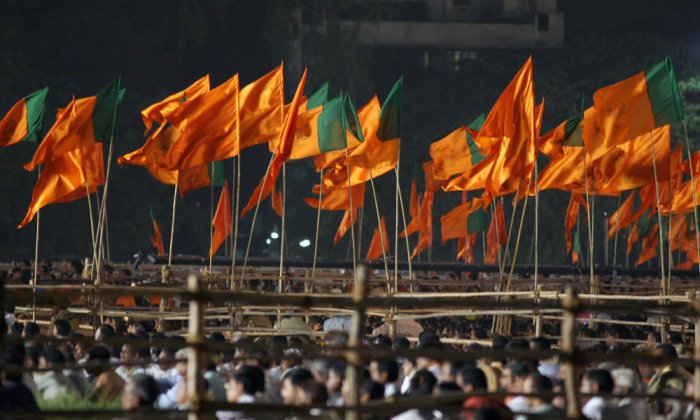
Modi’s Bharatiya Janata Party (BJP) was formed in 1980. Like India’s other nationalisms, however, its roots go back to the late 19th century, Image: BJP and Shiv Sena flags, via Wikipedia Commons
by Muhammad Ahmad Khan 18 April 2023
The world is witnessing a shrewd change in Indian policies internally to transform India into a Hindu Rashtra. Nehru, the visionary leader had envisioned India as a secular state that could provide a tolerant and feasible environment to all ethnic and religious groups so they could contribute to Indian prosperity. But what the world is seeing today of India, is totally against democratic principles and the visions of the country’s founding leaders. There is no denying that nationalism is important for every state, but the concept itself varies in its definitions depending upon the context. Nationalism will be a strong and fruitful force when it contributes to the development and prosperity of the country as a whole. We are not living in separated societies but the nation-states are capable of managing different nationalist groups under one identity. In India, although Hindus are the sole majority while Muslims, Christians, and other religious groups are persecuted for being minorities. Any policy measure taken to marginalize these minorities will shake the whole nation. Religious wars and ethnic uprisings from history have proven it. So, the well-being of a modern nation-state is dependent upon managing all groups either ethnic or religious effectively.
Currently, Bharatiya Janata Party is pursuing the objective of converting India into a Hindu Rashtra through certain institutional policy measures. The recent changes in history books in educational institutes are deplorably impacting what actual reality is. Three passages are being deleted from 12th class history and politics book as,
- “Instances like in Gujrat, alert us to the dangers involved in using religious sentiments for political purposes. This poses a threat to democratic politics”.
- “Gandhi’s steadfast pursuit of Hindu-Muslim unity provoked Hindu extremists so much that they made several attempts to assassinate him”.
- “Gandhi was particularly disliked by those who wanted India to become a country for the Hindus just as Pakistan was for Muslims”.
Moreover, explanations about Nathuram Godse, the murderer of Gandhi, and Mughal rule over India are also changed.
It shows that India under BJP is Hinduizing the whole of India. Persecution of minorities in the name of religion is condemnable doesn’t matter where it happens. The Gujrat massacre of Muslims during the time of Modi’s ministership was a horrible act that needed to be reprimanded widely. Professors of History and Politics in India have repudiated such changes in historical patterns. National Council of Educational Research and Training’s director, Dinesh Prasad Saklani has been defending the initiatives as measures for students’ ease. After the pandemic, to release the burden from students, extra and repetitive chapters are removed from the books. He said, “You tell me, when the content load is being reduced during times of such trauma, if the experts felt such-and-such things should be removed, so it was. How is it such a big thing? I mean, are all Brahmins assassins?” referring to Mr. Godse. While RSS members have been celebrating the changes, opposition parties are criticizing the government for such a wanton initiative. Prabhu Mohapatra, professor of modern Indian History at Delhi University said, “Gandhi’s assassination is a founding moment of our history and we are still suffering”. This will take India nowhere but rather toward producing a generation with myopic and ultra-nationalist mindsets whose consequences India will bear by itself.
Language is not just a mode of communication, rather it carries sentiments, and hidden meanings and is a major contributor to a nation’s culture. The patterns it carries are promulgated through literature and books read by children and affirmed by the generation that has seen these patterns happening. The major problem is that the Indian government is unable to understand the seriousness of these nationalist agendas. It is justifying its support to the Hindu nationalist sentiments that push other groups into a sense of deprivation and marginalization. If the government continues to carry out such an aggressive posture against these groups and changes in history, it can be concluded that India will face a huge blow from the inside. And no wonder when the country will be facing a huge blow from inside. The current Indian government is making an enfeebled attempt to keep the younger generation in darkness. But people who have witnessed these events will always reprimand such initiatives and will keep on dragging the younger generation into dissonance.
